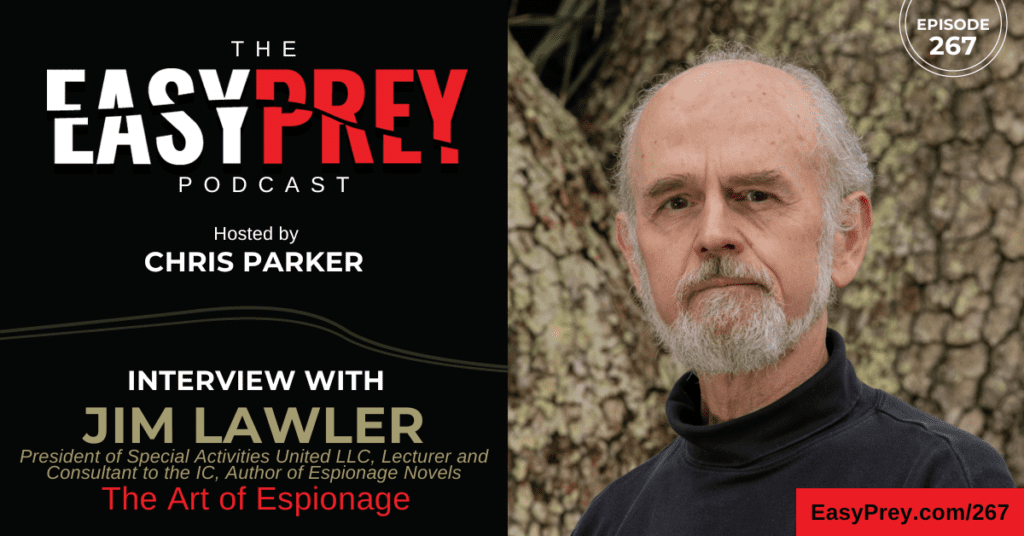
What makes someone betray their country? It’s rarely just about money. In this episode, you’ll hear from a retired CIA officer who spent 25 years recruiting foreign spies by tapping into something deeper than greed. Jim Lawler shares real stories from his career in human intelligence, where persuasion was built on empathy, trust, and understanding what truly drives people.
From failed pitches to high-stakes successes, he explains the psychology behind espionage, how personal stress becomes a powerful leverage point, and why most people who commit treason believe they’ve been betrayed first.
Whether you’re curious about spycraft or just want a better grasp of human behavior, this conversation pulls back the curtain on how people can be influenced to cross the line.
“Empathy is everything. To recruit someone, I had to get inside their head and know what made them tick.” - Jim Lawler Share on XShow Notes:

- [00:50] Jim was a CIA operations officer. His job was to recruit foreign spies for the CIA.
- [01:21] Most of his career was about battling weapons of mass destruction. His specialty was human intelligence and recruiting foreign spies was the backbone of that.
- [02:32] He's now a speaker and a teacher. He's also written three spy novels.
- [03:02] MICE Framework: Money, Ideology, Coercion, and Ego.
- [05:11] Jim shares a story from one of his first recruitment pitches. He also found out that revenge is a driving force for espionage.
- [11:58] Polygraph tests are stress detectors.
- [15:16] Divorce is one of the most psychologically tumultuous times in a person's life. When recruiting, Jim would become their best friend because he never once recruited a happy person.
- [16:07] He would study the crack system like a rock climber. He was a keen listener and very curious.
- [17:33] Empathy and patience were everything when recruiting spies.
- [20:21] Jim talks about the metaphysics, which is like a neural link where he would put out what he would envision as an invisible link to the brain of his recruits.
- [22:11] If something is too good to be true it is.
- [23:45] As a recruiter, he had to manipulate, exploit, and subvert people to get them to do what he wanted them to do.
- [27:58] Jim believes in treating people the way he would like to be treated. He was sincere with his actions.
- [28:35] He believes in using his powers of persuasion for good.
- [32:43] Over 90% of the people he pitched became assets.
- [33:48] Jim explains what a cold pitch is and the objective to get the second meeting.
- [36:58] His novels are thinly based on operations he did. A lot of his stories are based on things that he has done or things that his colleagues have done.
Thanks for joining us on Easy Prey. Be sure to subscribe to our podcast on iTunes and leave a nice review.
Links and Resources:
- Podcast Web Page
- Facebook Page
- whatismyipaddress.com
- Easy Prey on Instagram
- Easy Prey on Twitter
- Easy Prey on LinkedIn
- Easy Prey on YouTube
- Easy Prey on Pinterest
- Jim Lawler – SPYEX
- The Traitor's Tale (The Guild Series Book 3)
- In the Twinkling of an Eye: A Novel of Biological Terror and Espionage (The Guild Series Book 2)
- Living Lies: A Novel of the Iranian Nuclear Weapons Program (The Guild Series Book 1)
- Soulcatcher: James Lawler Discusses The Motivations For Espionage
Transcript:
Jim, thank you so much for coming on the podcast today.
Chris, it's my pleasure. I hope to have a very good conversation with you.
I'm sure we're going to have a great conversation. Can you give myself and the audience a little bit of background about who you are and what your life's work has been about?
I was a CIA operations officer, also known as a case officer, for 25 years. My job was to recruit foreign spies to convince people to commit treason, betray a trust, and become spies for the CIA. I did that for 25 years. I had 12 years overseas, with five overseas postings. I devoted most of my CIA career to battling the proliferation of weapons of mass destruction such as nuclear weapons, biological weapons, and chemical weapons.

I recruited a lot of other sources as well, and that was really my specialties, what we call HUMINT or human intelligence, and recruiting foreign spies is the backbone of that.
I've been retired since 2005, and since then, I've taught tradecraft, meaning how to recruit foreign spies to the CIA, to the FBI, to the DIA, to NSA, to the Department of Defense, and other members of the intelligence community.
I also give talks in corporate America on insider threats, how people can lose their intellectual property, and their research and development privacy because of folks on the inside who are recruited by people like me.
I discuss why people are persuaded to betray a trust, and I've been doing that now since my retirement. Now my latest endeavor is I've written three spy novels. The first one, Living Lies, the second one, In the Twinkling of an Eye, and my third one is called The Traitor's Tale. They're all about human betrayal and treachery.
I think you kind of answered my next question, which would be why would someone be willing to betray their country or betray their corporation?
There's a whole host of reasons. We have this acronym that we get in training; it's MICE. The first letter, M for money. The second letter, I for ideology. The third letter, C for coercion or blackmail. The fourth one, E for ego.
Personally, I don't believe anybody commits treason or commits espionage or does this for money alone. Money is frequently involved, but they seldom do it only for money. Virtually never. It's usually something else.
Personally, I don't believe anybody commits treason or commits espionage or does this for money alone. Money is frequently involved, but they seldom do it only for money. Virtually never. It's usually something else. -Jim Lawler Share on XI discovered in my career that frequently, there's not a single reason, but it's a whole mosaic of reasons why people betray a trust, why they commit treason.
I learned this lesson on my first major recruitment. I had gotten a message from CIA headquarters that advised all of the CIA officers in the field that we were about to engage in a set of very, very high-stake sensitive negotiations with a certain foreign country, and that we, the CIA officers in the field, should be on the lookout for any people from this country who had certain responsibilities, certain access, as we call it. Meaning, some of their foreign diplomats abroad.
I discovered in my career that frequently, there's not a single reason, but it's a whole mosaic of reasons why people betray a trust, why they commit treason. -Jim Lawler Share on XAs luck would have it, I had met a man from this particular embassy a few weeks earlier in a ski class just by accident, and we'd had a nice conversation, and so I started what we call development. Meaning, I am going to have frequent contact with this gentleman. I'm going to try and develop a relationship of trust because trust is at the basis of everything we do, which is ironic since I'm getting them to break a trust. I'm going to convince them to do the opposite, to replace their trust and their government with trust in me.
Anyhow, after a few weeks of developing a relationship, I got it in my head that I could persuade this man to commit treason simply based on our friendship, which was not all that long, and on the power of my personality and ability to persuade him to do it. This is very naive, just going into it with this very short set of reasons.
But I wrote to headquarters and asked for permission. We call it a provisional operational approval—a POA—so that I could pitch this man to become a spy. I went to dinner with him. I pitched him and he looked at me and he said, “Jim, you and I are friends, but what you're proposing, that's morally wrong.”
Chris, I've probably pitched maybe 60 people in my career. He's the only person that ever posed a moral objection.

Interesting.
Yeah, they might pose other objections, like I had one African intelligence officer say, “Jim, they'd hang me in my country if I did that.” He's right; they would. Although, he surprised me when he followed up that statement by saying, “Can I have a raincheck?” I said, “What?” He said, “Yeah.” He said, “My son is three years old. I don't need you now, but in 15 years, he'll be university age, and I might need you.”
I wrote that down in a file, and sure enough, 15 years later, he was posted to our country and the Africa division came and asked me if I thought that he meant what he said, and I said, “Yeah.” And guess what? That raincheck was cashed in.
But going back to my first recruitment pitch was an abysmal failure. It was very naive, very shallow. I had no vulnerability data on this guy whatsoever. I just thought I could persuade him to do this. Well, he turned me down, and we have a saying at the CIA that it's OK to be turned down, but not turned in.
Meaning, “What do I do? What am I going to do if he goes and tells his ambassador?” Oh, yeah. I didn't tell you the fact that he's number two in the embassy. He's the ambassador's deputy. But what if he goes and tells the ambassador, “Mr. Lawler over at the American Embassy? He just propositioned me to commit treason,” and his ambassador had a real hot temper and a reputation for being a real loudmouth, and I could just envision this man storming into our ambassador's office and lodging a very, very stiff diplomatic protest, outrageous behavior on the part of young third secretary Jim Lawler.
Even though I had headquarters approval, I was about 10,000 miles from home and I could just see people going into cover your ass position saying, “How did Lawler mess this up?”
“He did what?”
I did what? Even though they gave me permission. Well, “He did what? He must have screwed it up. We never thought he'd screw it up so badly.” I'm having these nightmare feelings that this is going to go really bad. After about three days, I gave him a call just to see if he and I were still friends, and I was relieved when he didn't hang up the phone in my ear.
I said, “We had so much fun the other night. I thought maybe we'd go out and have dinner again on Friday.” Now, Chris, my only objective was to smooth any turbulent waters to maybe back out of this, apologize, and say that my words were taken out of context, which actually I was pretty damn clear what I wanted. But I was going to try and smooth this out somehow to where he wasn't insulted and going to tell me to his ambassador.
But I never got that chance. For one thing, as soon as I said that, “How about if we go out again?” He said, “You know, Jim, I was thinking the same thing.” I took that as an encouraging sign that, OK, we're still friends.
I go off to the second dinner, which is one week after that first one. The only objective, again, to make sure we were still buddies. The first words out of his mouth after the waiter dropped the menus off was, “Jim, that offer you made me last Friday, is that still good?”

Oh, wow.
Oh, wow; that's right. And I said, “Of course it is. We're friends.” He said, “What you don't know is my wife, a couple of days after that dinner, announced that she wants a divorce and I cannot go through that divorce and pay her the alimony to which she's entitled and put my two high school-aged boys in private schools when we go home, because in my country, if you don't get a private school education, you don't get a good education. I can't do that unless I accept your offer, even though I know it's morally wrong.”
We learned something in law school: if the judge rules in your favor, shut up and get out of court quickly. I didn't argue the fact or anything like that, and so I agreed that he would be a spy for the CIA.
At the very next meeting, our first clandestine meeting, he brought me a stack, maybe five or six inches thick of classified correspondence, and classified in his government's classification top secret. As he handed it to me, he said, “Jim, let me tell you. Part of the reason I'm doing this—actually, it's a big reason why I'm doing this—is because the ambassador steals all the credit for everything I do and everything everybody else in my embassy does. He marches around this country like a little banty rooster saying what an important guy he is.”
He says, “I hate him. And as I hand you this stack of classified material, it's as if I'm kicking that son of a bitch in the face.” I took the material from him, and I said, “You and I are on the same team. Bring me some more and let's kick that son of a bitch again,” and he laughed. But I found out that revenge is absolutely one of the driving motivations for espionage. Otherwise, unless you are a total narcissist or a total sociopath, you don't justify that unless you can justify the fact that you were betrayed first. You're not betraying something; they betrayed you first.
Well, anyway, he went on, he was a good spy, and then he was going to be posted back to his home country and we were going to put him through a polygraph test. Now, polygraphs are sometimes incorrectly described as a lie detector test. They're not. They're stress detectors. That's all they are.
Some people, I'm not one of them, but some people say you can correlate stress with fabrication, stress with deception, things like that. I'm not a strong believer in polygraph tests, but a good polygraph operator, in fact, is a good psychologist, and he can try and gauge whether somebody's telling the truth or not.
Now, we were going to put this gentleman through a counterintelligence polygraph, basically three very simple questions, black or white. Like, “Number one. Have you told anyone about your secret relationship with the CIA? Yes or no. Number two. Are you working with any secret intelligence organization other than the CIA? Yes or no? And finally, number three, did anyone direct you to volunteer to Mr. Lawler at that meeting where you agreed on your relationship with the CIA? Also, again, yes or no.”
The polygraph operator is supposed to stick to those questions, not stray off and go on a fishing expedition unless the person being tested gives them license to do so. But as luck would have it, I had a first tour polygraph operator who'd never been overseas, and the first question out of his mouth was, “Golly, gee. I'm just wondering why you are doing this.”

Oh, gee.
Oh, gee is right. My heart rate, I'm sure, is spiked because I thought he's going to have a moral epiphany and he's going to storm out of here. I was amazed when he laughed and he said, “Because I think this is going to be a lot of fun.” Basically, a thrill seeker. He wanted to be a spy.
He went on to become a very good spy, and he was able to participate in the negotiations that were so critical to national security and not only was he able to tell us his country's negotiating positions, but he also told us all about their fallback positions. I always analogize by saying, “If you went to a car dealer, wouldn't you like to know the lowest dollar you could offer to buy a car?” After which, the guy would say, “No, I can't do it.” Well, that's exactly what this guy did, and it was estimated that he saved the United States government tens of billions of dollars because we knew exactly what their positions were.
But to get back to motivations on espionage and things like that. It was a whole mosaic. Yeah, he loved his boys. He was in financial issues because of the alimony thing. He hated his boss. He also told me at one point that he was a very fair-skinned, blue-eyed, blond guy, but in a country where most of the people were mixed race, and he thought he was a victim of reverse discrimination. Again, he's justifying it, and that's fine. I'm not going to argue with the guy.
But there's usually a whole lot of motivation that goes into this and it's rarely just one, and it's never or hardly ever just money. I was able to hit him at the right time. In fact, over the next several years, I recruited three people going through divorce, and I've learned that divorce is one of the most psychologically tumultuous times possible in a person's life. It's emotionally, psychologically, and financially stressful. If you have me in your orbit and you have something I need, I become your best friend. I'm like your life ring.
In fact, over the next several years, I recruited three people going through divorce, and I've learned that divorce is one of the most psychologically tumultuous times possible in a person's life. It's emotionally, psychologically,… Share on XI always say I never once recruited a happy person. I recruited people under stress and it was a lot like if you or any of your listeners have ever been rock climbers, in order to climb a rock, you look for a crack system. Put your fingers and toes to climb the rock. You can't climb smooth rock and you can't tell the crack system from a long way off.
But people are like that. They have a crack system, and if you get close, you can study the crack system and then you know exactly how to relieve the stress. I think that was the secret of my success in a lot of my recruitments was I'm an extremely keen listener.
I'm a very curious person, meaning that I'm curious that before you and I got on the air here, Chris, I was asking where you live. A little bit about your background. I wasn't doing that anything other than I'm just curious why you became a podcaster and things like that. Another thing, another secret to recruitment or persuasion.
Can I ask you one question?
Yeah, please. Go ahead, Chris.
I wonder about this kind of revenge motive. Is that, at some point, potentially a double-edged sword in that if they feel that they've been betrayed by you, now you become the target of their revenge or their rage?
If they ever felt that, yes and that has happened to some of my colleagues, but I never betrayed any of my assets. In fact, we consider our assets, our spies that we recruit, their security, to be our top priority, and I want them to continually know that. I am there for them, and I want them to be able to share everything with me, which is why listening ability, empathy, is everything. To recruit someone, I want to get inside their head and know what makes them tick.
Another quality is patience. It took me 10 years to recruit one source because in the first nine and a half years, he didn't need me. We were friends. In fact, we were more than friends because I was best man at his wedding.
Another quality is patience. It took me 10 years to recruit one source because in the first nine and a half years, he didn't need me. We were friends. In fact, we were more than friends because I was best man at his wedding. -Jim… Share on XWhen I'm going after somebody, I'm going after them. But he didn't have any cracks that I could see until he went through a divorce. The wife, the wedding that I attended as the best man, decided she didn't want to live 10,000 miles from home, so she took their new baby, child, and went home to her home country. He was devastated by this divorce, and then he returned to his home country. In the meantime, in the years that he had been gone, his ethnic and racial group were no longer in power.
Suddenly, he was confronted with a dilemma, and he wrote me an email. He said, “Jim, I could work 24 hours a day and seven days a week, and I will never be promoted again. How can I give allegiance to a country that treats its citizens like that?”
Well, that's like a big sign saying, “Recruit me.” I met him in a European country, drop cover, meaning I admitted that I was really with the CIA, not with the State Department, which was my cover, and I said, “I'd like you to be on my team.” He said, “Jim, now I've got something to believe in.”
Basically, I brought him into my team, over to my side, and he went back to his home country. He was in his foreign ministry when 9-11 happened. He was there watching on television as our Twin Towers were falling. He told me later that he became very emotional.
He was basically crying, and his colleagues were curious, wondering, “Why in the world are you so upset?” He said, “What they didn't know is I'm on your team now.” He basically transferred allegiance to us.
Anyway, having a persuasive personality I think helps. I'm a fairly intense person. In fact, on my last polygraph test, because we have periodic polygraph tests inside the CIA, typically, every few years. Well, the polygraph operator says, “Mr. Lawler, there's one word that your colleagues and coworkers all use about you.” And I said, “What is that?” He said, “The word is intense.”

I said, “I can use that, I can wear that. That's fine with me.” Being intense, being creative, and being a careful observer of stressors in people's lives. All of those are elements of persuasion. But the final mystery element, the one thing that I think gave me an edge, is something that I call the metaphysics.
Now the metaphysics, I use that term loosely, but it's like a neural link that if I was going to pitch you, Chris, you and I would go into a different plane of existence and I would literally like put out what I envision as an invisible link into your brain to get you to do what I want you to do.
I know that sounds like real new age-y and things like that, but I swear to God I can. It works. It does work. One of my students, who was a deep -cover CIA officer, thought it might be something to do with hypnosis. He says, “I was using the same techniques as Dr. Milton Erickson, who developed hypnotherapy back in the 60s and 70s.” Maybe so.
I know another asset of mine once remarked about my voice. She said, “Jim, when I'm listening to you, it's like my brain is in a warm water bed,” and so my voice is soothing. I think frankly, if I hadn't been a case officer, I would've been good as a therapist, maybe a psychiatrist, or a psychologist.
I am never condemned. I never take people to task for something. I'm very reassured and people like that. They look forward to meeting me and want to do what I want to do. You asked me earlier before we started recording this program if there were things people could do to prevent someone like me from having my way with you. There are a few things.
One thing: if something is too good to be true, it's too good to be true. A guy my age or your age, Chris, and we walk into a bar, and suddenly a gal who's 20 years younger, who's sexy as hell, comes up to you. Let me tell you, guys, you're not George Clooney. You didn't suddenly become number 10 on the scale. Something's off. If something's too good to be true, usually it's too good to be true.
Now I think about what I did, persuading people to become spies for our national security. I think that's right. In fact, I gave a talk similar to this at an NSA one time, a few years ago; I must have had 500 or 600 people in the audience.
At the end of this—and I tell very graphic stories about how I recruit people—at the end of this, a young man in the back raised his hand and he said, “Mr. Lawler, do you consider yourself to be a moral person?” I said, “That's an interesting question and I've, I've thought about that a lot. In fact, I think that a young Marine Corps sniper, if he takes an Al-Qaeda bomb maker into his sights at a thousand yards, that Young Marine Corps sniper is a moral person.”
As long as I do this for national security purposes, that I'm a morally purposeful person, where it becomes maybe immoral is how much I enjoy it, though—I mean to be able to manipulate people's lives. I tell people, “You want to know what I do? I manipulated, I exploited, I subverted, and I suborned people. I manipulated them to do what I wanted them to do, and I was good at it.”
What makes you kind of like that, that sense of like, “It's a good thing that I wasn't doing this for my own benefit all the time”? Where do you draw the line, or where would you draw the line in that sense?
I've used it personally a few times. It's amazing. I've gotten myself outta traffic tickets by just telling the cop that we're not going to…”We’re just going to forget about this now, aren't we?”
This is not the person you want to give the Jedi mind trick. You are not going to write a ticket.
Yeah, basically, and they don't. I've got this ability to persuade people to do things they might otherwise not do. But where would I draw the line? Well, I don't know. I've never used it to say in a romantic relationship because I don't think that's fair. I want the other person to really want it, to want whatever.
I have never used blackmail or extortion. I think that's like driving down the street with a rattlesnake in the backseat because that person will turn on you. Like you said earlier about somebody would betray you if they were doing this under coercion, they would betray you.
My job was always to keep them pumped up. I had a senior officer once when a colleague said, “Jim, you're nothing but a cheerleader.” I said, “OK, that's fine. If I can make them feel good about this,” and I always rewarded the people that I was working with. I would build in little bonuses to give them nice gifts.
They got good compensation for what they were doing. If they needed something badly, I would try and do whatever I could to get it for them. I think the most important thing in most of my assets’ lives, was the fact that I was listening, and they would tell me things that they would not tell their best friend or their spouse because I was safe. I didn't condemn it. I was never judgmental. If they wanted my advice, I'd give it, but I didn’t, I didn't say, “Chris, you ought to be doing this or something.”
I think the most important thing in most of my assets’ lives, was the fact that I was listening, and they would tell me things that they would not tell their best friend or their spouse because I was safe. I didn't condemn it. I… Share on XYou ought to become a spy.
I don't know.
Would you consider your assets friends?
That's a good question. Some of them definitely were the guys that I took 10 years to recruit. He and I would go running on the weekends long distance. We're both long-distance runners. The difference being that he was world-class and I'm not. In fact, he and I are still in touch and he signs his emails and stuff to me as your brother. I felt very close to him.
There were other people, however, that in ordinary circumstances you would not want to be friends with. But I have an ability to try and find at least one redeeming quality about anybody. Even Hitler was good to his dogs, so I don't know.
If you try hard enough, you can find that even the most reprehensible person, the most narcissistic person, can find something about them that is redeeming, and then they reciprocate. They don't have many friends because they're such jerks. But you're becoming their friend and you're listening to them, and you're understanding them, and that gives me an edge on people where they're not going to betray me because I may be their only friend.
It's interesting because, like everything that you're talking about, persuasion is so opposite of what happens in most scam and fraud-type situations. Like the person's abusive, they're mean, they're nasty, they're raising their voice. They're trying to exploit the person, hurry them, and like everything that you did is almost the exact opposite of all that.
I think so. I mean, one basic thing is I'm a strong believer in the Golden Rule. I treat others as I would want to be treated. And I'm sincere, and they feel that, and they know that, that I'm not a bad person. I'm a good person, and I care about them.
Could I be a con man? No, I couldn't because that would go against my moral principles and conscience, even though if you ask me could I use my power of persuasion to get some of that, I could. But that's not fair. That's not something I would want to do. I use whatever powers I have for, I think, the good.
Do you know of any of the people that were assets that specifically regretted working with you after the fact?
No. Actually, three of my assets were once arrested because they committed espionage, and they did some other things, too. But we had a commitment. I'd made a commitment to them on behalf of our director for their security, and we got every one of them out. It was through no fault of their own; it was just almost inevitable that they were going to get caught at some point, and they did. Then we got them, we got them out.

This is not always the case, however. I had a very good friend, a good CIA, an officer friend of mine who once asked me to have lunch with him at the CIA headquarters building and then to walk around the building afterwards. He told me that one of the Russian spies that Aldrich Ames had betrayed, he was the recruiter. My friend was his recruiter, and this guy was shot, and my friend said he wouldn't have died if I hadn't recruited him.
I said, “Francis, you didn't betray him. That was Aldrich Ames.” But my friend, he wept. That's how close we get to our assets and how much we value their security. It's a sacred trust. It's a vow that we take, that we're going to do everything possible to keep these people safe.
I mean, during the time that the assets that I'd recruited were in prison, I lost a lot of sleep, and finally we got them out, though. Thank God.
Did any of your assets try to recruit you? Because I figure if you're making an overture of, “I want to recruit you,” if they were technically a counterpart to you as opposed to a government official, could it be a little bit like, “OK, let me see if I can flip the guy that's trying to flip me.”
Not really, but sometimes they did influence me, and well, OK, I'll tell you. I mean, I was handling; I had not recruited, but I was the handling officer for a senior Arab ambassador. He was a member of a group that is very much opposed to the United States. But we had recruited him, and I was handling him, and he did tell me a lot about his people and his country. It kind of opened my eyes. I think I was a little more sympathetic to his people and why they did what they did because of that.
Now, he wasn't really recruiting me except maybe in a philosophical sense. But it did open my eyes to the fact that these people aren't doing this just for no good reason. It was illuminating to me to see that. But no, I never had anybody pitch me or even try to recruit me. Although sometimes I thought, “Well, why didn't they do that? What am I, chopped liver?”
I don't know why they never did. Actually, we had a policy at the agency that if you were pitched, you were to tell the intelligence officer who pitched you that not only is it no, but it's hell no, and you're going to report the pitch.
In fact, in some, a few cases, we actually authorized the officer. If, let's say it was a Russian who offered me a million dollars, you'd come back and say, “How about if you worked for us for $2 million?” Basically, we doubled the offer. That would basically stop the other side from doing this because some of their people might actually go for it.
Of the people that you pitched, did most of them end up becoming an asset, or was there a portion there that didn't?
Well over 90%, and especially as I got better at it. This is a skill like anything else in life; if you really are focusing, you become better at it. I'd say I was in for 25 years, and I'd say in the last 15 years, my vetting average was close to 100%.
Somebody once asked me if I ever pitched somebody that I thought would say no. I thought, “Why would I do that?” Because usually, you've got little test things that you're putting out there and hypotheticals, and even to describe the recruitment meeting as a single meeting is really a fallacy because it's a series of meetings and finally, you get that person to do what you want them to do. That's the culmination. But you've been building on that for a number of weeks, months, whatever.
Now we have another thing called a cold pitch. The cold pitch is where I have never met you, but I know you have access to secret information that we need, and there are certain techniques in a cold pitch where you can maximize your chances of success.
Your objective is not so much recruitment, it's to get the second meeting, get that next meeting, and also hopefully not have them report it to their security people. You might say, “Well, why would they not report it?” Well, there are a lot of reasons why somebody might not report the pitch to their security people.
Number one, they might be thinking about it. Number two, if they report it to their security people, their security people might look at them and say, “Now Chris, why is it that they picked you? What does the CIA know about you? What skeletons are in your closet?”
You're now a liability.
You may not want to have your fingernails pulled out while answering those questions. The point was to try and get that next meeting and then you work on the person. But yes, I have done cold pitches and recruited on the first meeting.
I would assume—are the cold pitches more monetarily motivated? Because if you don't have, really have the time to figure out where their cracks are and if there isn't any logic…
The most successful cold pitches are—I call them cold, but they're actually a little bit lukewarm. Let's say we were going to cold pitch you, Chris, but you'd never met me. But we have some people in touch with you or we're following you on social media and we notice that maybe you're going through a divorce or maybe you go to the casino a lot, maybe you're in trouble because you go to the casino a lot, or maybe you've had some drinking or drug problems, or maybe you've got elder care issues. Maybe you've got children that have special needs.
If I know all that stuff, I can vouch that pitch to where I know exactly what you need. Then you are going to be more receptive. You're going to listen to me.
Cold in the sense that you may not have had a conversation with a person.
And you've never seen me before.
But not cold in the sense that you don't know a whole heck of a lot about that person.
The less you know, the less chance it'll work. The more you know, the better the chance it'll work because frequently, we'll have a deep-cover officer who can't risk pitching a target, but they have observed the person. They may know about the person, they may know that the person is going through all kinds of personal turmoil, and they tell me about that.
Then, even though that person has never met me, I go in there with basically a peek at their cards. I know how to appeal to them, and I may know that some things turn them off, and I won't do that, but some things that they find persuasive.
Got you. How much of your experience has gone, and I'm assuming that your books are fiction, or are they nonfiction?
No, they're fiction. All three of them are spy novels. Espionage novels.
How much of the books come out of, not necessarily things that you did that are not necessarily based on real-world situations, but based on the experiences as a whole, if that makes sense.
Frankly, I'd say it's both. There are a number of parts of my first book, Living Lies, that there's operations that I did, and I thinly disguised them. My latest book, The Traitor's Tale, again, some of that thinly disguised. But I based a lot of my stories on things either I've done or things that my colleagues have done, and so it becomes easier for me to write about them.
Some of my characters are actually based on some of my friends with their permission, and it's easier. If you're a portrait artist, for example, there's a reason why somebody has a model sit there so that they can paint them or draw them, and it's much easier to do that than to just paint somebody just out of sheer imagination.
I have some colleagues that I admire and respect a lot, and so I've figured them into all of my books. Actually, there's one woman, Paula Doyle, who in my books, she's Paula Davenport; she becomes the deputy director of CIA.
Another good friend is Scott Stewart. He was a counterintelligence officer, and he's in all three of my books as Brian Bannock. Then I've got a few other characters that, especially in my new book, based on real people I know.
I know a very, very distinguished and colorful Texas attorney whom I based a character on in my latest book. He is an amazing person. In fact, I didn't have to make it, I didn't have to make him up at all. If anything, in real life, he's even more colorful than my character in his book, but he loves the fact that I've got him in the book, and I love him. He's a wonderful man.
That's cool. Just kind of like one of the following questions, just because I'm a nosy person sometimes.
No, you're just curious. You're just curious.
Has your background in your work helped you in your interpersonal relationships?
I don't know. My wife probably should answer that question.
I wouldn't like, if it's part of your job to always be listening and to always be kind of pulling threads, so to speak. I assume that that technique also happens in your interpersonal relationships where you talked about being naturally creative and just have a character of trying to be endearing to people.
Well, I hope so. I think I'm a thoughtful and loving husband and a thoughtful and loving father. Our three children, we had a policy, which, and I used to tell them, “The foundation of any human relationship is trust; the same as espionage.” We had a policy that whatever they did, I would forgive it as long as they told me the truth. A couple of times they would say to me, “Dad, is the policy still in effect?”
Like, “Uh oh, what'd you do?”
I strained myself because if they tell me that they did something, no matter how bad it was, I had to forgive them. But just, you had to be honest and tell me the truth, and that's the same relationship that I had tried to have with my covert assets. We had to trust each other, and they had to tell me the truth. Not only intelligence reporting but also counterintelligence problems and issues they may have.
Yeah, it very much sounds like you're the same person. Either you're the same person while working and not while working. You may have different, you may have different goals. You're not trying to dupe your friends into espionage against the companies they work for or anything like that.
Most of the time, I'm doing this for national security because I'm not doing it to persuade you to buy something or anything like that. In fact, I just think it's kind of unfair because if I tried, I could do it. I just don't want to do it. I told somebody when I used to work against intelligence officers. It was more like a fair game of tennis. But if I go against a person who's not a trained intelligence officer, that's really like shooting fish in a barrel. I don't get any jollies out of that.
Yeah, that's because you have integrity and morals.
Well, thank you. I think I do.
At least, hopefully you do. It sounds very much from your experiences that that is who you are. I super appreciate your time today. Again, where can people find you? What are your three books and where can they find them?
The latest book is The Traitor's Tale. It is on Amazon. The other two books, Living Lies, is the first book, and In the Twinkling of an Eye, is the second book. Finally, The Traitor's Tale. You can read them out of order. They're not strictly sequels. But it might make a little more sense if you started with Living Lies and then went to In the Twinkling of an Eye, and then The Traitor's Tale, but you can read them out of order.
Then, if you do get it from Amazon, any author always appreciates reviews. Just a brief review would be appreciated. I have an author's website. It's called the [inaudible 00:42:21] and so anybody who wants to go online to my author website, it's got more bio about me and about my books and the various podcasts such as this one.
Awesome. We'll make sure to link to all of those in the show notes, and I super appreciate your time coming on the podcast today.
Chris, you're an amazing host. Thank you so much, and I am not trying to manipulate you.
Well, thank you very much. I appreciate that.


Leave a Reply